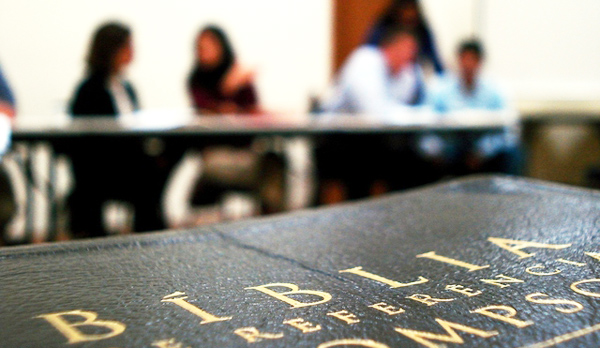Dietrich Bonhoeffer (February 4, 1906 – April 9, 1945) was a German Lutheran pastor, theologian and a participant in the German resistance movement against Nazism. He was involved in plots planned by members of the Abwehr (the German Military Intelligence Office) to assassinate Adolf Hitler. He was arrested in March 1943, imprisoned and eventually hanged, just before the end of the Second World War in Europe. Bonhoeffer’s classic work The Cost of Discipleship was written at the height of his conflict with Nazi ideology and with the compromising German church.
Such Were Some of You
Do you not know that the unrighteous will not inherit the kingdom of God? … And such were some of you. But you were washed, you were sanctified, you were justified in the name of the Lord Jesus Christ and by the Spirit of our God (1 Corinthians 6:9-11). Such were some of you. On one hand, what sweet words these are to believers! The church is not for perfect people but for sin-scarred, once-blind, still struggling people.
Pray for the Word to Speed Ahead
“Pray for us, that the word of the Lord may speed ahead and be honored, as happened among you“ (2 Thessalonians 3:1). In this single verse Paul reminds of the importance of two of the chief things God has given us to do in the world: prayer and proclaiming God’s Word, both for the glory of God. Pray! Pray for us as ministers of the gospel; but even your prayers for us are ultimately prayers for the advancement of the Word of God.
Why Did Jonah (and Why Do We) Disobey God?
Now the word of the LORD came to Jonah the son of Amittai, saying, “Arise, go to Nineveh” (Jonah 1:1-2). God spoke plainly to Jonah and instructed him to visit the capital city of Israel’s enemies with a message of repentance and, ultimately, grace. Yet Jonah refused. Why did Jonah — and why do we still today, as recipients of the Great Commission — disobey God?
You Can’t Teach What You Don’t Know
In Deuteronomy 6:5-7 we are reminded that we cannot teach what we don’t know. We are told first, “You shall love the Lord your God with all your heart and with all your soul and with all your might” (5), and then we are instructed to teach God’s Word diligently to our children (7). You cannot teach your children (or friends, or co-workers, or others you have opportunity to disciple) to love what you do not love yourself.
Are You a Christian?
This beautiful, biblical description of a Christian comes from James Smith in 1856. As you read this pastor’s wise and insightful summary of the Christian life, prayerfully consider — not only whether these words describe you, but — how they may better describe you. May each of us as Christian believers learn Christ’s doctrines better, trust his promises better, and do his will better. If anyone is in Christ — he is a new creature:
Overcoming Disagreement For God’s Glory
Now concerning our brother Apollos, I strongly urged him to visit you with the other brothers, but it was not at all his will to come now. He will come when he has opportunity (1 Corinthians 16:12). Even our very best plans often meet with significant snags. Many variables can conspire to derail our plans, but one in particular often proves a great help or hindrance in our efforts: people. Planning would be so easy if it weren’t for other people with other opinions! Pastoring, marriage, child-rearing, and evangelism would all be a cinch if you just didn’t have to
What Is Imputation, and Why Does It Matter?
Imputation is the act of one person adding something to another person’s account (Genesis 15:6). As believers in Jesus Christ, we have this clear assurance in Scripture: at the cross, our sins were imputed to Christ and Christ’s righteousness was imputed to us. The imputation of sin, as we see in Romans 5:12-15, is the way that God made for us to be saved. Our sin was placed upon Jesus Christ, and his righteousness was given to us, in order that we be saved.
The Daily Relevance of Jesus’ Resurrection
I delivered to you as of first importance what I also received: that Christ died for our sins in accordance with the Scriptures, that he was buried, that he was raised on the third day (1 Corinthians 15:3-4). The resurrection of Jesus is a pivotal point in human history. And it is, as Paul reminds us here, a pivotal point of the Christian message. Indeed, no one was more aware of, or insistent upon, its significance than Jesus himself.
We Will Be Changed In a Moment, After a Lifetime of Struggle
Not long ago I lead a study on the doctrine of “Glorification” in a systematic theology series for the Baptist Collegiate Ministry at the University of Cincinnati. I was greatly blessed in considering the eventual, promised perfection of the people of God. Yet I was also impressed all over again with the fact that every aspect of our salvation — including even our glorification — is not ultimately about us, but about God.
Your Salvation: Paid In Full
When Jesus had received the sour wine, he said, “It is finished,” and he bowed his head and gave up his spirit (John 19:30). The phrase Jesus uses here on the cross expressed a business transaction completed: “paid in full.” At the heart of trusting in Jesus Christ for salvation is the confidence that nothing else needs to be added to the price he paid, in his death, for our salvation. Do you live in the reality of a fully-paid salvation each day?
Magnify Him With Thanksgiving
I will praise the name of God with a song; I will magnify him with thanksgiving (Psalm 69:30). At first glance, the psalmist’s declaration may seem strange. How does one “magnify” the omniscient, omnipresent, almighty God who holds the universe in his hand? In other words, how can anyone make an everywhere-present God bigger?
No One Who Abides In Him Keeps On Sinning
No one who abides in him keeps on sinning; no one who keeps on sinning has either seen him or known him (1 John 3:6). This is a sobering passage. It is meant to be. However, it should not be a passage that causes the Christian believer to despair. John is not condemning the one who is seeking to overcome sin, but the one who habitually gives into sin without repenting. John purposefully describes here the one who is (or is not) continually sinning (as is evident from the “linear present”, or continuing action, of the verbs in the original
What Is Salvation, and Where Is It Found?
For by grace you have been saved through faith. And this is not your own doing; it is the gift of God (Ephesians 2:8). Salvation means “to deliver” someone out of danger. Salvation, especially in the Bible, implies then that people need to be saved. It also implies that someone is able and willing to save the person who needs to be saved. The Bible teaches that Jesus Christ is the only source of true salvation for any human being.
What Is Sanctification?
If you are a believer, then you are “sanctified”, you are a saint (same root word). The word sanctification means “to set apart for a particular purpose.” There is no ceremonial act—not even baptism or the Lord’s Supper—which is needed in order to be saved, or sanctified. This may be confusing, however, because the Bible often talks about, even exhorts us to, sanctification as a goal. This is because there is more than one aspect to God’s setting us apart; he sets apart in different ways and for different purposes.














